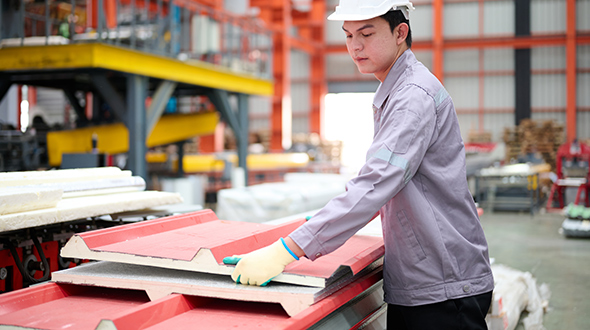Want the best commercial roof insulation to reduce energy costs and protect your commercial building? Commercial roof insulation is a vital component of your roofing system, and knowing which best suits your roofing type is critical. This article covers the main types of insulation, their benefits, and tips for choosing the best one for your needs.
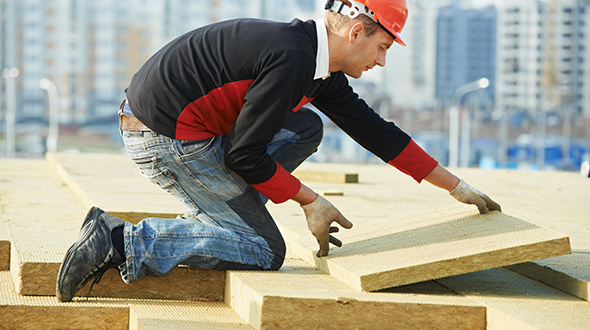
Key Takeaways
- Proper commercial roof insulation is crucial for energy efficiency, reducing heating and cooling costs, and extending the roof’s lifespan.
- Key insulation options include spray foam, polyisocyanurate (Polyiso), extruded polystyrene (XPS), expanded polystyrene (EPS), and mineral wool, each offering unique benefits based on specific applications.
- Choosing the right insulation involves considering factors like building type, climate, budget, and compliance with local regulations, while professional installation and maintenance are essential for long-term performance.
Understanding Commercial Roof Insulation
Commercial roofing insulation is essential and often required by building codes. Proper installation significantly reduces heating and cooling costs by limiting thermal transfer. This helps maintain comfortable indoor temperatures and enhances the building’s overall energy efficiency. The proper insulation can lower utility bills and extend your roof’s lifespan.
Conversely, neglecting proper insulation can cause long-term damage. Roofs without adequate insulation are more vulnerable to weather-related wear and tear, leading to premature replacement and higher maintenance costs. Understanding the importance of roof insulation enables informed decisions that benefit both your building and your finances.
Key Types of Commercial Roof Insulation
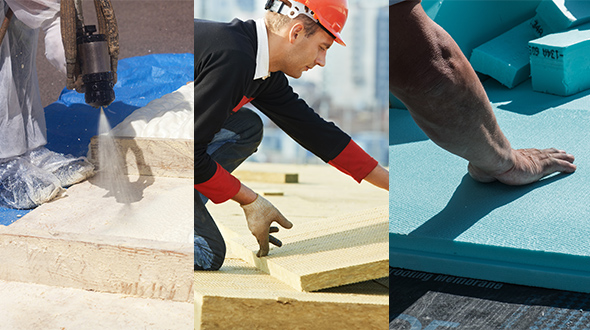
Choosing from the many commercial roofing insulation options can be overwhelming. Knowing the most common types simplifies the selection process. Material type, installation method, and R-value are crucial factors in determining the best insulation for your commercial roof.
We’ll explore common types of commercial roof insulation: spray foam, polyisocyanurate (Polyiso), extruded polystyrene (XPS), expanded polystyrene (EPS), and mineral wool. Each type offers unique benefits and suits different applications, making it important to understand their specific properties.
Spray Foam Insulation
Spray foam insulation is renowned for its high thermal resistance and soundproofing capabilities. It can achieve an R-value of up to 7.2 per inch, making it one of the most efficient insulators. Its ability to conform to irregular surfaces ensures complete coverage and reduces potential insulation gaps.
Beyond its thermal properties, spray foam insulation also offers structural benefits. It enhances dimensional stability, resists moisture, and provides fire resistance, making it a versatile choice for various commercial roofing applications. It also helps reduce energy bills, making it a cost-effective long-term option.
Polyisocyanurate (Polyiso) Insulation
Polyisocyanurate, or Polyiso, is another popular choice for commercial roofing insulation. It offers an initial R-value of 6.8 per inch, providing excellent thermal efficiency. Certain polyiso products maintain a stable R-value at various temperatures, ensuring consistent performance.
Polyiso is highly versatile and suitable for various roofing systems, including single-ply systems like PVC or TPO. The outer foil-facing layer enhances insulation efficiency and protects against environmental impacts. The tapered design of some Polyiso products ensures effective drainage on low-slope roofs, enhancing their utility.
Extruded Polystyrene (XPS) Insulation
Extruded polystyrene (XPS) insulation, often recognized by its color-coded dye, is a common choice for commercial roofs. XPS excels in moisture resistance, making it suitable for below-grade and various roofing assemblies, including flat and low-slope roofs.
XPS insulation maintains a stable R-value over time, ensuring consistent thermal performance throughout its lifespan. This stability, combined with its lightweight nature, makes XPS a reliable and efficient choice for commercial roofing projects.
Expanded Polystyrene (EPS) Insulation
Expanded polystyrene (EPS) insulation is known for its cost-effectiveness and lightweight properties. It provides similar insulation performance to XPS but at a lower cost, making it an attractive option for budget-conscious projects. EPS is compatible with various membrane systems, including PVC and EPDM, allowing versatile applications in roofing assemblies.
High-density EPS offers an R-value of 4.6 and comes with a 100% R-value warranty from Insulfoam, which makes EPS a reliable and durable choice for commercial roofing insulation.
Mineral Wool Insulation
Mineral wool insulation is renowned for its fire resistance and stability at high temperatures, making it ideal for demanding environments. Its water-repellent properties further enhance its suitability for various commercial roofing applications.
In addition to its thermal and fire-resistant properties, mineral wool also provides soundproofing benefits, contributing to a more comfortable indoor environment. These features make mineral wool a highly effective insulation option for commercial roofs.
Choosing the Right Insulation for Your Commercial Roof
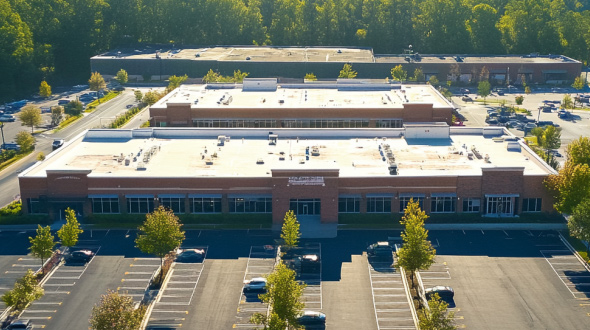
Choosing the right insulation for your commercial roof involves considering factors like building type, age, local regulations, and budget. Climate is crucial, as regions with extreme temperatures need insulation with higher thermal resistance.
Budget constraints are significant, as some insulation materials with higher upfront costs can yield considerable energy savings over time. Compatibility with the chosen roofing system and adhesives is essential to avoid future installation issues. Consulting roofing professionals can provide insights tailored to your specific needs and requirements.
Installation Best Practices
Proper installation is crucial for achieving optimal thermal efficiency and longevity. For example, polyisocyanurate can be applied directly to steel decks to meet specific fire safety approvals.
Adequate attic ventilation prevents heat and moisture buildup, prolonging the life of roof insulation. Regular professional inspections can detect unnoticed issues, ensuring roof integrity and preventing costly repairs.
Maximizing Energy Efficiency with Roof Insulation
Energy-efficient roofing systems reduce energy expenditures by lowering the need for artificial heating and cooling. A well-insulated roof minimizes heat loss in winter and keeps interiors cool in summer, contributing to consistent indoor temperatures and comfort.
Investing in energy-efficient roofing can result in substantial long-term savings on energy bills. Following ASHRAE standards and energy codes ensures insulation selection and promotes energy efficiency in commercial buildings. Choosing eco-friendly insulation materials can enhance indoor air quality and reduce energy consumption.
Maintenance and Longevity of Roof Insulation
Regular maintenance of roof insulation is crucial to maintain its energy efficiency and longevity. Cover boards can protect roofing systems from mechanical damage, reduce maintenance costs, and extend the roof’s lifespan.
Regular inspections help identify issues like missing shingles and cracks, allowing for timely repairs. Monitoring granule loss in gutters and promptly removing moss and algae can prevent significant damage to roof materials.
The Role of Cover Boards in Roofing Systems
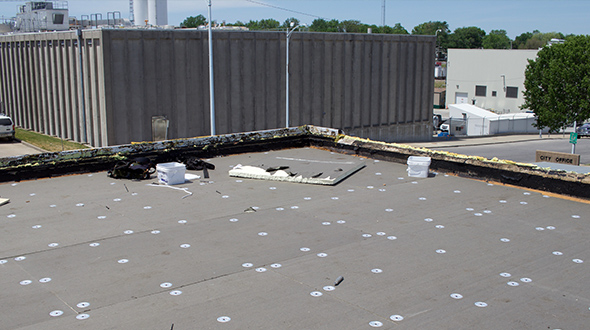
Cover boards are essential components that protect the underlying insulation from damage and enhance overall roof performance. They shield roof insulation from mechanical damage, foot traffic, and environmental impacts, ensuring the long-term performance of the cover board.
Common types of cover boards include:
- High-density polyiso
- Low-density polyiso
- Cement
- Gypsum
Each type offers different performance benefits. Cover boards enhance the durability of flat and low-slope commercial roofing while improving moisture resistance and acoustic comfort.
Sustainable Insulation Options
Energy-efficient roofs significantly reduce a commercial building’s environmental impact by lowering carbon emissions. Sustainable roofing solutions benefit the environment, enhance a business’s reputation, and appeal to eco-conscious consumers.
Eco-friendly insulation materials, such as cellulosic fibers and wool, are sourced from renewable resources and often have a longer lifespan, reducing replacement frequency. Using recycled or reclaimed materials in insulation minimizes landfill waste and supports local economies.
Working with Professional Contractors
Hiring professional contractors ensures comprehensive roof health and optimal performance. Regular inspections, at least every two years, can identify potential issues early and recommend the best insulation options.
Professional contractors bring extensive experience and expertise, ensuring the roofing system is installed correctly and efficiently. Their knowledge of insulation materials and techniques helps tailor the project to meet specific needs and budget constraints.
Commercial Roof Insulation Summary
Understanding and selecting the right commercial roof insulation can lead to significant energy savings, increased lifespan of the roofing system, and enhanced building performance. From spray foam to mineral wool, each insulation type offers unique benefits. Proper installation and regular maintenance further ensure the longevity and efficiency of the insulation. By investing in sustainable and energy-efficient roofing solutions, businesses can not only reduce their environmental impact but also appeal to eco-conscious consumers.
Insulation Frequently Asked Questions
What is the most energy-efficient type of commercial roof insulation?
Spray foam insulation is the most energy-efficient type of commercial roof insulation, offering a high thermal resistance with an impressive R-value of up to 7.2 per inch. This makes it an optimal choice for maximizing energy efficiency in commercial buildings.
How often should I inspect my commercial roof insulation?
Regular inspections of your commercial roof insulation should occur at least once every two years to ensure its integrity and address any potential issues promptly. Adhering to this schedule will help maintain the overall health of your roof.
What factors should I consider when choosing roof insulation?
When choosing roof insulation, it is essential to consider the building type, age, local regulations, budget, climate, and compatibility with the roofing system and adhesives. These factors will ensure optimal performance and compliance with standards.
How does proper roof insulation contribute to energy efficiency?
Proper roof insulation enhances energy efficiency by minimizing heat loss in winter and maintaining cooler interior temperatures in summer, reducing reliance on heating and cooling systems and significant energy savings.
Are there eco-friendly insulation options for commercial roofs?
Eco-friendly insulation options for commercial roofs include materials like cellulose and wool, which are derived from renewable resources and contribute to reduced environmental impact through longevity. These choices not only enhance sustainability but also lower the need for frequent replacements.
(404) 220-9288
The post Commercial Roof Insulation Options Explained appeared first on atlantacommercialroofingcontractors.com
